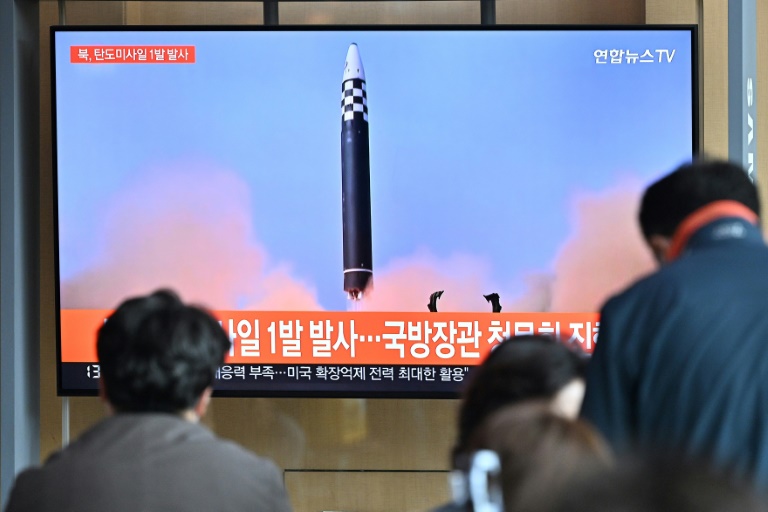
North Korea launched what Seoul claimed was a ballistic missile on Wednesday, a week after its leader Kim Jong Un promised to accelerate the development of the country’s nuclear arsenal.
This new weapons test comes as South Korea and the United States expect Pyongyang to resume its nuclear tests, interrupted in 2017.
The North Korean regime had already, in March, broken a five-year moratorium on its intercontinental ballistic missile (ICBM) tests by launching a powerful projectile capable of reaching the United States.
South Korea’s Joint Chiefs of Staff said in a statement on Wednesday that a « ballistic missile launch by North Korea at 12:03 p.m. » (0303 GMT), a priori from Sunan airport, in the north from Pyongyang.
The projectile traveled 470 km and reached an altitude of 780 km before falling in the Sea of Japan, added the staff, describing this firing as « a flagrant violation of the resolutions of the Security Council of the United Nations ».
14 shots since January

The Japanese Minister of Defense, Makoto Oniki, confirmed this trajectory and specified that the missile had ended its race “outside the exclusive economic zone of Japan”.
« The repeated launching of ballistic missiles threatens the peace and security of our nation, the region and the international community, » he lamented.
UN Secretary-General Antonio Guterres on Wednesday urged « North Korea to completely stick to its international obligations. » « This shooting (…), using ballistic missile technology, only increases regional and international tensions, » added its spokesman, Stéphane Dujarric.
Despite harsh international sanctions, North Korea has stepped up efforts in recent months to modernize its military, and has carried out 14 test firings since January.
At a grand military parade on April 25, North Korean leader Kim Jong Un vowed to « strengthen and develop our nation’s nuclear capabilities at an accelerated pace. »
« Nuclear weapons, a symbol of our national strength and at the center of our military power, must be enhanced in terms of quality and range, » he said.
« Life buoy »

A few days later, he called the nuclear weapon « a lifeline guaranteeing the security of our country », and threatened to use it « as a preventive measure ».
Numerous diplomatic talks aimed at convincing Pyongyang to give up the atomic bomb have stalled since the failure in 2019 of a meeting between Kim Jong Un and then-US President Donald Trump.
“There is a good chance that they tested (on Wednesday) a missile that could be equipped with a nuclear warhead,” Ahn Chan-il, a researcher specializing in North Korean affairs, told AFP.
The new launch also comes less than a week before the inauguration of new South Korean President Yoon Suk-yeol, a conservative who has promised to be tougher on his northern neighbor.
During his election campaign, Mr. Yoon pleaded for the United States to strengthen anti-missile defenses in South Korea, and even to deploy tactical nuclear weapons there.
US President Joe Biden is due to visit South Korea at the end of May.
Washington « very worried »

The Pentagon spokesman said on Wednesday that he was « very concerned about these tests and the provocative nature of their ballistic missile program ». John Kirby said the United States had invited Pyongyang to return to the table for talks « without preconditions » while working « on being ready for our alliance » with Seoul and Tokyo.
Asked on Tuesday whether to vote in May on a US draft resolution increasing international sanctions against Pyongyang, US Ambassador to the UN Linda Thomas-Greenfield replied that the United States planned « to go from forward » this month about it.
Put on the table of the Security Council in April, the text, obtained by AFP, plans to reduce from four million to two million barrels the quantity of crude oil that North Korea would be authorized to import each year for civilians, and impose restrictions on further North Korean exports, including mineral fuels and clocks.
According to diplomats, China and Russia, holders of veto power in the Council, have so far refused to discuss the content of the draft. No date for a vote has been put forward, said one of these diplomats.

The new missile test ‘could be a warning sign’ for Mr Yoon, said Hong Min of the Korea Institute for National Unification, saying that Pyongyang will never accept the main condition set by the new South Korean leader to resume peace talks, namely the renunciation of nuclear weapons.
« It could also be a signal from Pyongyang that it has no choice but to strengthen its arsenal if Seoul and Washington decide to deploy strategic armaments in the South, » added this expert.
According to Cheong Seong-chang, North Korea specialist at the Sejong Institute, North Korea « will try to test as many missiles as possible » in order « to improve the capabilities of its arsenal at a rapid pace ».
■

